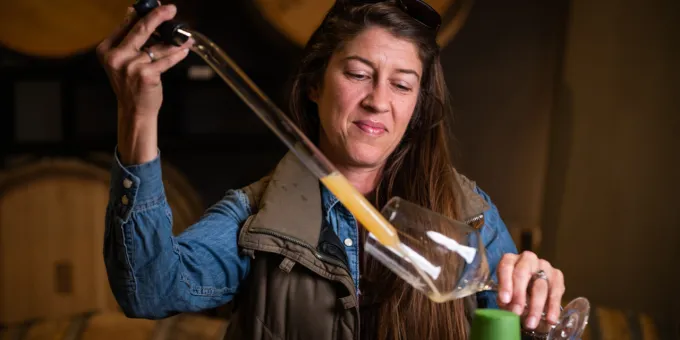Few of us, it’s safe to say, spend a meaningful amount of time thinking about where our food comes from. Whether we’re congregating in a kitchen to cook a family feast or sitting down at a Michelin star restaurant to celebrate a special occasion, rarely does the conversation turn to crop yields or how hard the farmers and farmworkers toiled to grow the fruits and vegetables on our plates.
That’s about to change—effective immediately. That’s because California Grown, the nonprofit connecting consumers with the people who grow and produce their food, has designated October California Farmer and Farmworker Month.
“This month was born out of the desire to thank our farmers and farmworkers for working tirelessly through the pandemic to keep food on the grocery store shelves,” said Cherie Watte Angulo, executive director for California Grown. “As communities sheltered in place, the industry quickly regrouped, supplying the proper PPE to the workforce and shifting food headed toward foodservice to retail outlets and food banks where need was the greatest.”
There are multiple ways to show your support for California farmers and farmworkers. Start by spreading the word: For every public social media post using the #CAGROWN hashtag during October, California Grown will contribute a pound of food to a local food bank. You can also make sure to purchase California-grown food, wine, and flowers, and it never hurts to visit your local farmers markets and tell farmers how much you appreciate them.
Another option: Listen to the latest California Now Podcast, which features interviews with three fascinating farmers who all have unique stories to share.
Take Nikiko Masumoto, for instance. She’s a fourth-generation grower at the Masumoto Family Farm in Fresno County. She’s also the author of two books and somehow found the time to give an acclaimed TEDx talk in 2015.
As she explained to California Now Podcast host Soterios Johnson, farmers help nourish consumers on a variety of levels.
“I think especially this year, when there has been so much uncertainty, it's really important to think about the core elements of a nourished life, a life that is full of support and health and well-being,” Masumoto said. “Farmers and farm workers absolutely are at the core of that. We can't live without food and food has the power to not only nurture our bodies, but to connect us with cultural identities, connect us through family, through friendships. And really, for me, the food and the act of eating together, that's what kind of keeps me going on a day-to-day basis even when times are kind of dark.”
While Masumoto is fully prepared to go deep on the social and spiritual aspects of eating, she hasn’t lost sight of the purely physical pleasures of doing so.
“When I think about eating, Soterios, like you, I just love the actual embodied experience,” she said on California Now. “And there's something about eating food, especially produce, closer to where it's harvested. The flavors get to retain their authentic power, and so I think the closer you can get to the source, the better the flavor is going to be.”
Vailia From, the winemaker and owner of Desparada Wines in Paso Robles, also enjoys the fruits of her labor. For her, every bottle of Nebbiolo or Sangiovese tells its own story—and she cherishes the opportunity to share these narratives with customers at her Tin City tasting room.
“How often do you pick up a glass of wine or take a bite of something…and really think about all the steps that went into the making and manufacturing of it?” From asked. “That is definitely incredibly rewarding, being able to pull a cork on a bottle that my husband or I made, whether it's something we just bottled three weeks ago or something that we made 10 years ago, and seeing how that drinks and remembering everything that went into it and the people and the place.
“It's an amazing craft to share with people.”
Steve Schafer is a natural-born storyteller too. The fourth-generation farmer has been growing almonds for the better part of four decades, and between that operation and San Joaquin Winery, which he opened in Madera County in 2009, he’s seen pretty much everything there is to see.
From his vantage point, the farm workers he employs deserve every last bit of recognition that comes their way during California Farmer and Farmworker Month.
“One thing that a lot of people don't realize is that the farm workers we have here, they work hard, and they're a benefit to this country by being here,” Schafer said. “I don't have people working for me that commit crimes. I mean, they get up every morning, and they go to work”
“We had one guy work for us, started working for us when I was a little kid,” Schafer continued. “He worked for our family for 50 years. We've got a lot of people that have worked for us for 25 and 30 years. If you were to send everybody home, I think the state of California would shut down. Certainly agriculture would [shut down], and probably the hotel and restaurant industry would go right with them.”
In other words, Johnson noted during the podcast interview, California farm workers truly are essential workers.
“They are definitely essential,” Schafer replied. “There's no doubt about that.”
